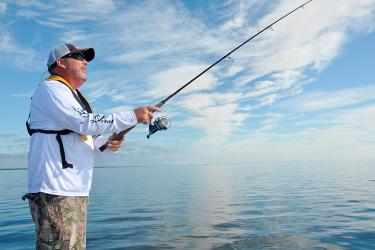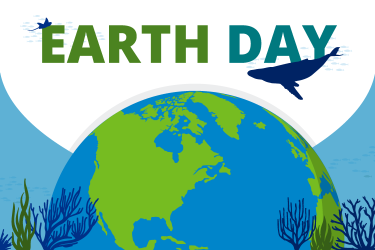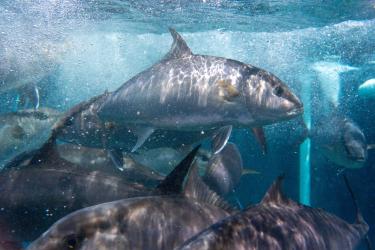U.S. leadership was instrumental in a landmark decision to adopt the first management procedure for Atlantic bluefin tuna at the 2022 annual meeting of the International Commission for the Conservation of Atlantic Tunas. They also played a key role in new bycatch mitigation measures for sea turtles, and ICCAT’s first decision on the management of ICCAT fisheries. Held in Vale do Lobo, Portugal, November 14–21, ICCAT saw parties from around the world work together to find consensus on key fisheries management issues for Atlantic tunas, swordfish, sharks, and protected species.
Preserving Critical Stocks: Atlantic Bluefin Tuna Management Procedure Adopted
In a historic agreement, ICCAT adopted its first management procedure (MP) for both stocks of Atlantic bluefin tuna. An MP is an approach to fisheries management decision-making that applies a pre-agreed framework for actions, such as setting catch limits, designed to achieve specific objectives. These objectives could include meeting conservation obligations and providing stability in fisheries. This is the second MP adopted by ICCAT following years of hard work by ICCAT scientists and managers. This advancement will allow for more effective management of stocks in the face of identified uncertainties. The MP establishes annual total allowable catches for 2023 through 2025 for western Atlantic and eastern Atlantic and Mediterranean bluefin tuna. It includes a stable TAC of 2,726 metric tons for the western area.
Mitigating Bycatch of Endangered and Threatened Sea Turtles
Led by the United States, ICCAT adopted its first measure on gear and bait modifications to mitigate the impacts of fishing interactions on sea turtles. The proposal was co-sponsored by Brazil, Canada, Gabon, Egypt, Turkey, and the European Union. It requires science-based mitigation measures, such as the use of circle hooks in shallow-set longline fisheries, in the Atlantic Ocean. These measures will reduce bycatch and increase post-release survival of sea turtles that are unintentionally caught in ICCAT fisheries. The adoption of this agreement is a welcome breakthrough. The United States has been promoting this issue at ICCAT for years, and similar measures have been adopted in other regional fishery management organizations.
Planning for the Future: Broad Support for U.S Climate Proposal
The Commission adopted a U.S.-led proposal that calls on the Commission to account for the impacts of climate change on ICCAT-managed species and related ecosystems. A diverse coalition of ICCAT parties from North and South America, Asia, Africa, and Europe joined as co-sponsors. The proposal kick-starts a process to identify available information, data gaps, and research needs that will better inform the Commission's future management of ICCAT species. Chaired by the United States, ICCAT will convene a joint meeting of scientists and managers in 2023 to begin this essential work.
“By adopting this resolution, ICCAT is taking a critical first step toward developing a more flexible, responsive, and adaptive management regime for our shared marine resources. As the person entrusted to lead an inaugural meeting, I look forward to collaborating with ICCAT parties, including both scientists and managers, to build climate-resilient fisheries in the Atlantic Ocean.” - Kelly Kryc, Ph.D., U.S. Commissioner to ICCAT
Combating Illegal, Unreported, and Unregulated Fishing
ICCAT agreed to expand and strengthen an existing measure designed to combat illegal, unreported, and unregulated fishing. It requires ICCAT parties to investigate and take appropriate action, consistent with their domestic laws, to address allegations of IUU fishing by their citizens. ICCAT’s rules now cover not only those individuals directly engaging in illegal fishing activity, but also those benefiting from or supporting IUU fishing activities (e.g., as vessels operators, owners, and even financial services providers).
To further strengthen ICCAT’s multilateral compliance process, the Commission adopted a Schedule of Compliance Actions. It provides a set of common standards for evaluating the severity of incidents of non-compliance and applying responsive actions in a fair and transparent manner. The Commission also reached agreement on the mandatory use of electronic reporting to submit certain scientific and compliance-related data. This will improve the efficiency of operations and the accessibility of information submitted to ICCAT.
Throughout the week, ICCAT parties engaged extensively in constructive negotiations on developing a joint high seas boarding and inspection scheme for the ICCAT Convention Area. It included ways to ensure broad and equitable participation in the scheme. Though parties could not find a way forward to consensus, the discussions represented a significant step forward in efforts to adopt a crucial tool to combat IUU fishing and monitor compliance with ICCAT rules in international waters.
Negotiations on Tropical Tunas Continue
Difficult negotiations on a revised conservation and management agreement for tropical tunas continued in 2022, following several years of effort that resulted in little progress. Ultimately, the Commission adopted a measure that carried forward the current management measures, including the TAC, for Atlantic bigeye and yellowfin tuna. This avoided an unacceptable lapse in management for the fishery. ICCAT parties agreed to continue discussions on TAC, allocation, and other management measures intersessionally.
Other Key Outcomes
ICCAT adopted a measure on North Atlantic swordfish that maintains the current TAC and U.S. quota. Scientific work continues on developing management strategy evaluation for this important stock. Based on this, the Commission aims to adopt an MP for North Atlantic swordfish in 2023 that will determine TACs for 2024 onward.
In another important conservation outcome, the Commission adopted a measure on South Atlantic shortfin mako sharks. This agreement borrows many provisions from the 2021 North Atlantic stock of shortfin mako measure, which was the result of years of hard-fought negotiations. The measure allows retention of South Atlantic shortfin mako over the next 2 years in line with the scientific advice and specifies individual retention limits for ICCAT parties.
Kryc concluded, “The outcomes of this meeting represent huge wins for ICCAT species and their ecosystems, as well as the United States and other nations that rely on these fisheries. We are returning home with a package of decisions that moves us into a modern fisheries management paradigm that takes climate into account for some of the most iconic and sought-after species in the world.”



